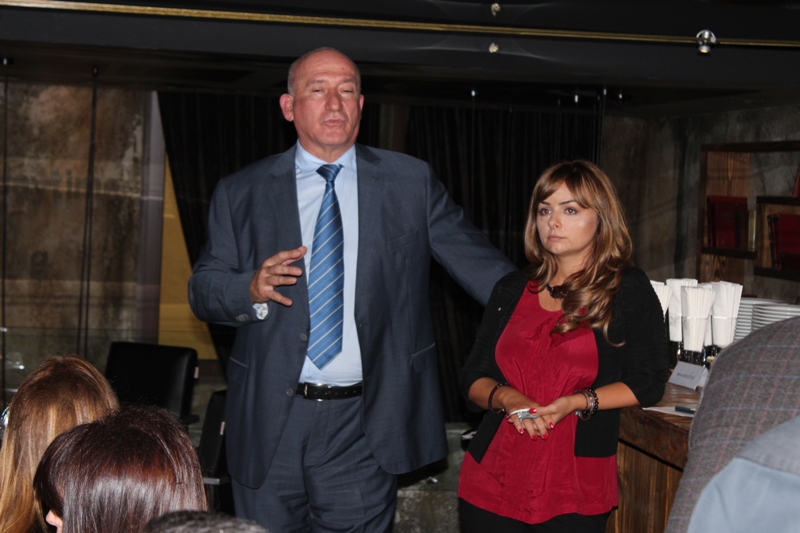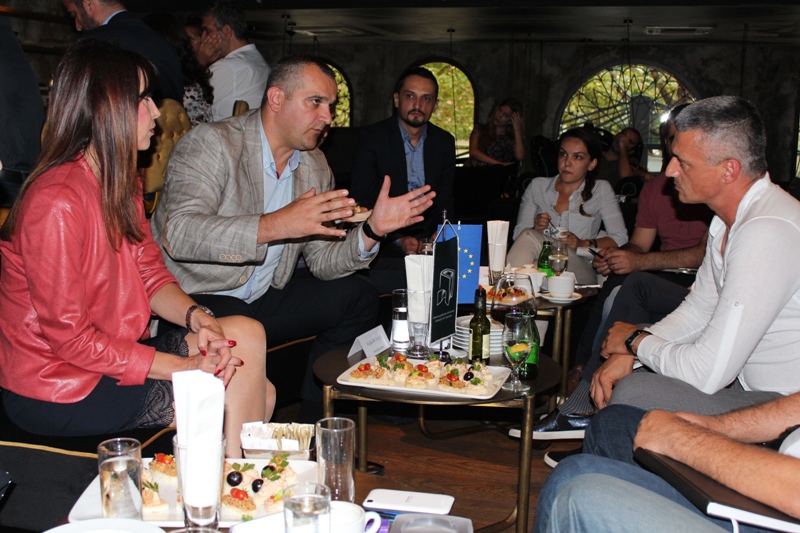Centre for Civic Education (CCE), in cooperation with Friedrich Ebert Stiftung (FES), organised a meeting between the representatives of civil society organisations and Milivoje Katnić, Chief Special Prosecutor of Montenegro, within the project «European café», based on the principle of World Café method, whereby the topic was: “Rule of law in Montenegro – importance of the establishment of Special State Prosecution and achieved results in light of the negotiations on EU accession”.
Daliborka Uljarević, CCE executive director, opened the European café emphasising that «state of Montenegro is as strong as its institutions are, as well as resistant in terms of the inappropriate pressure from those who run the institutions. Only in such system, based on democratic principles, which fosters the work and respect of the law, and not the so called «doable approach» or «party loyalty», in other words corruption, one can expect tangible results and specific progress in this area.» In that regard, she stated that «the positioning of Special State Prosecution is extremely important in the fight against the corruption, organised crime, war crimes, terror and money launder. The prosecution has been functioning for more than a year now and it has, with the reason, caught the eye of the public, which was characterised with different performance assessments. » Uljarević gave special thanks to Katnić for the willingness to have an open conversation with representatives of civil society in an informal ambient, thereby estimating that current approach of the public to Prosecution is new and much more improved compared to previous.
During his opening remarks, Milivoje Katnić, Chief Special Prosecutor of Montenegro, stated that «rule of law, in brief, implies the limitation of state power by law, the absence of arbitrary and discretional government, equality of every person before the law, legal certainty, protection of civil (human) rights and freedoms, as an imperative of values and content which lies before contemporary legal systems. » He underlined that «respect of human rights and freedoms must be a landmark of rule of law, legal state and its bodies. » Reflecting on what was done so far, Katnić explained that the primary task of State Prosecution is the «affirmation of principle of equality before the law, as one of the fundamental postulates of legal state and rule of law, while the prosecutors must daily rely on principle of legality in work and principle of impartiality. » He pointed out that «only with such regulated base and tasks, can we observe the position and role of State Prosecution in positively – legal regulations, or the provisions on the independence and the ever increasing level of independence of state prosecutors. Moreover, these principles acknowledge the recommendations by the European Union, provided during the accession negotiations.» By discussing on further activities, Katnić told: «We will reach our goal once the prosecutors become subordinate to Constitution and law only, a tenet which makes the basis of rule of law and which constitutes the notion of legal state. In addition, we have to create general social conditions and elect the prosecutors whose personality reflects their principles. »
During 2015, when this programme started, CCE organised four meetings between the representatives of civil society and national and international decision-makers, within the European café. Previous guests of European café were: Mitja Drobnič, former Head of the EU Delegation to Montenegro, Aleksandar Andrija Pejović, Chief negotiator for the conduct of negotiations on the accession of Montenegro to EU, Gudrun Elizabet Steinacker, former ambassador of FR Germany in Montenegro and Zoran Pažin, Minister of Justice in the Government of Montenegro. Year 2016 began with a meeting of representatives of civic opposition Miodrag Lekić, president of DEMOS, Aleksa Bečić, president of Democrats of Montenegro and Dritan Abazović, vice president of United reform action (URA), followed by the meeting with Jozo Radoš, MP of European Parliament and member of Stabilisation and Association Parliamentary Committee of EU (SAPC).
The objective of the European café is to create a platform for open and fruitful informal discussion which will contribute to the improvement of cooperation between civil sector and institutions, as well as to the intensifying of the communication, mapping the existing challenges and defining the proposals for their solution, but also informing on special aspects of process of accession of Montenegro to EU, all through the discussion of representatives of NGOs in Montenegro with different stakeholders of that demanding and complex process.
Meeting was attended by 25 representatives of civil society organisations, where they also had the opportunity to talk with Milivoje Katnić’s associates: special prosecutors Veljko Rutović and Stojanka Radović, as well as with Tanja Božović, head of the cabinet.
Svetlana Pešić, programme associate


